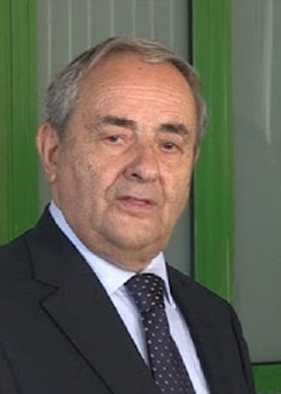February 2020, Year XII, no. 2
Raffaello De Ruggieri
The Visionary Mayor
"For me, Culture isn’t consumption; it’s production, dissemination and exchange. I am of the opinion that Culture is the expression of an energy spread throughout the community it originates from. Matera has succeeded in being reborn because the cultural question has transformed into a political question, meaning that citizens participate in the destiny of their own Polis."
Telos: Every time someone talks about the direct election of the Prime Minister, people use the very evocative expression “Mayor of Italy”. So, is it true that a Mayor has, in the administration of his or her own city, more power than the Prime Minister has today?
Raffaello De Ruggieri: Mayors are split between two conditions. From a political standpoint, the Mayor is actually extraordinarily strong because the political life of the City Council is closely connected to that of the First Citizen: if the Mayor resigns, the Council is dissolved. This allows the Mayor to master and navigate the asperity inherent in normal political dialectic.
However, where the Mayor is weak is in the everyday administration of the Municipality. As Galli della Loggia pointed out, anyone who holds an elected political office, more than directing an administrative machine, often it directs him, meaning that the municipal civil servants have the power to speed up or slow down, and in some cases even obstruct, the will of the Mayor or a Council member. I agree with Galli della Loggia when he states that: “Rather a system has been established that is the opposite of democracy since at least politics answers to the electors; now bureaucracy doesn’t answer to anyone.” That politics has practically no power in the relationship with bureaucracy is a proven fact.
The breakdown in the party system has likely been the source of people’s widespread anti-political sentiment. And yet this gap between citizens and politics is not nearly as wide when it comes to the Mayor. Are your citizens still passionate about politics?
In the Municipalities, it is the human dimension that prevails even over political aspects.
The separation between citizens and parties – I would say diffidence, if not flat out resentment – in the Municipalities leads to the proliferation of civic lists where the political dimension mixes with the personal dimension. More than political passion I see that citizens are close to the problems, the daily problems especially, of the community. The anti-political feeling can be overcome with the courage to undertake a serious constitutional reform allowing us to move past this long transition from the so-called “First Republic” to a Republic that has yet to be born. This is the first step in bringing citizens closer to the destiny of the Polis.
2019 was a special year for your city: the European Capital of Culture. A success for the young-old Mayor, as you have defined yourself. Can you tell us about the initiatives that you feel have marked this extraordinary year? Not necessarily the most relevant ones, but those dearest to you.
In 2019 over a thousand events were organised in Matera.
Of course, I have a very strong memory of the inauguration ceremony of the Matera Capital year but the event that struck me more than any other was when the opera Cavalleria Rusticana was performed in the Sassi. When they played the notes of Mascagni’s intermezzo in Piazza San Pietro Caveoso, the extraordinary nature of that geographical location that made history became apparent with moving and explosive force. Unforgettable.
In addition to being the Mayor, you seem particularly engaged in all the political actions connected to culture. From your personal story, punctuated by your commitment to Culture, we can understand why. Culture is, in your opinion, ‘social energy’. What does this mean?
Actually, the Culture delegate is senator Giampaolo D’Andrea, formerly the Undersecretary of Cultural Heritage and now an advisor for Minister Franceschini. For me, Culture isn’t consumption; it’s production, dissemination and exchange. I am of the opinion that Culture is the expression of an energy spread throughout the community it originates from. Matera has succeeded in being reborn because the cultural question has transformed into a political question, meaning that citizens participate in the destiny of their own Polis. The long march that began in the ‘50s started with small groups of dynamic people who were aware that they were the descendants of history, not of shame as many wanted to make us believe.
Recovering history’s fixed capital and translating that into the city’s role in its development has made true revolution necessary: a revolution that transforms citizens into cultural inhabitants. This is the only way to create the conditions for Culture, rooted in the community’s consciousness, to generate the social energy that is crucial to spark the creative ferment that nourishes it.
Marco Sonsini
Editorial
You must have heard of Raffaello De Ruggieri. At the very least, you must have come across him in newspapers in 2019, when Matera, his city, was the European Capital of Culture. De Ruggieri has been defined in many ways: a healthy carrier of social adrenalin, a visionary heretic inspired by the ideal of social profit, planning and development not only for Matera but for the entire Basilicata Region and all of Southern Italy.
One thing is sure, future vision is the ideal that inspired his political and administrative activity. And this is indeed why we have called this issue of PRIMOPIANOSCALAc : The Visionary Mayor. The language De Ruggieri uses when he speaks to us is refined, full of food for thought and never ordinary. He answers our now classic, challenging question from our #InterviewsWithMayors about the Prime Minister being like the “Mayor of Italy” with a concise yet accurate analysis: “From a political standpoint, the Mayor is actually extraordinarily strong because the political life of the municipal council is closely connected to that of the ‘First Citizen’: if the mayor resigns, the council is dissolved. This allows the Mayor to master and navigate the asperity inherent in normal political dialectic. However, where the Mayor is weak is in the everyday administration of the Municipality.” However, this is where the public administration machine prevails: “That politics has practically no power in the relationship with bureaucracy is now a proven fact.” And in our opinion, this is not just true at the local level. Right after that, De Ruggieri leads us by the hand into his vision, into his emotions. And instead of taking stock of the past year – when his dreams actually came true – he shares with us what was, for him, the most moving moment: the performance of the Cavalleria Rusticana in the Sassi. And if you were not lucky enough to be there, you can re-live the experience here. A few things De Ruggieri certainly does not lack are irony, cultural substance and provocations.These characteristics – perhaps along with his sophisticated way of speaking – are what put him at the centre of debate, even at the international level. “We don’t want tourists. A mayor really isn’t supposed to say something like this.” This is how the piece “An Ancient Corner of Italy Finds the World on Its Doorstep” begins. In the article, New York Times journalist Danielle Pergament writes about the days she spent in Basilicata and Matera, which was gearing up to become the 2019 Capital of Culture. She talks about having coffee with the mayor, who gives her the highlights in the city’s 8,000-year history, clandestinely revealing that in the “Sassi” there are people who have been living there for 50 years – who stayed even during the time when it was forbidden.
His statement sparked a great deal of debate and attracted a lot of media attention, to the extent that De Ruggieri was forced to clarify what he really meant in a note: “Matera doesn’t need aimless tourism.” “I cannot stand that Matera could become some open-air dive. Pizza by the slice, by the kilometre, by the metre, they can go somewhere else and certainly not to these places where man has lived for over 8,000 years.” The Mayor’s words are harsh, but we are absolutely certain that we all agree, because they perfectly describe what is happening in the historic centres of practically all our cities. This is not an elitist vision of tourism. Actually, it’s the exact opposite: preserve and maintain so that everyone can enjoy the beauty of our cities, today and mainly in the future. With his vision, De Ruggieri is furthering a mission: a mission to ensure that, according to the quote by the late French orchestra conductor Pierre Boulez that visitors see as they head towards the heart of Matera, “culture makes that which is highly unlikely inevitable.” Matera is next in line in our series of covers where the graphic of first letter of the city is designed so that it becomes part of the animal that represents it, either because it’s typically found in the city’s natural environment or because it’s one of its local heraldry. The design “genetically modifies” the animals to represent the transformation urban centres must face in complex times like those of today. This month we have been inspired by the natural environment: we have chosen the lesser kestrel (or Falco naumanni), a small falcon typical of Matera and the Murgia Materana. It is a protected species that flies up from South Africa between early March and late April to nest between roof tiles, in holes in walls and on the cornices of the buildings and churches in the historic centre and in the Sassi. According to a census, there are about one thousand couples; and there is a place in Matera where you can admire many of them: a stone pine right in the middle of the city.
These small falcons use this pine as place to sleep and seem to be totally oblivious to the city traffic…
Mariella Palazzolo

Raffaello De Ruggieri has been the Mayor of Matera since June 2015, elected with the support of a centre-right coalition. On 19 January 2019 he inaugurated the year Matera was named the European Capital of Culture, something De Ruggieri himself helped bring to the City of the Sassi as a member of the promotional committee, which he has been a part of since 2011. What makes him stand out is the length of his civil engagement in the restoration, protection and promotion of the artistic and cultural heritage of the Lucania area.
He established and directs the Zétema Foundation, through which he undertakes research projects and direct local interventions, including events such as the inauguration of the MUSMA (the Contemporary Sculpture Museum of Matera).
He has been a member of the Superior Council for Cultural and Landscape Heritage, appointed in 2007 by former minister Francesco Rutelli; and from 2012 to 2015 he was on the Board of Directors of the University of Basilicata, where he has also taught Management of Cultural Heritage. In 1959 he helped to found the association La Scaletta, through which he has carried out studies and research on recognising and promoting Matera’s caves. Over the years he has edited numerous books on the Cave Churches and has waged civil battles to restore the environment and urban planning of the well-known Sassi districts and of the stunning Murge Plateau. His political engagement represents the culmination of these battles. As Councillor for the Basilicata Region (1985-1990) he drafted two laws that were unanimously passed: the law instituting the Parco delle Chiese Rupestri (the Cave Church Park) and the law instituting the Centre for the Promotion and Management of Historical-Environmental Resources.
He is a lawyer and was born in Matera in 1935.
Marco Sonsini







SocialTelos